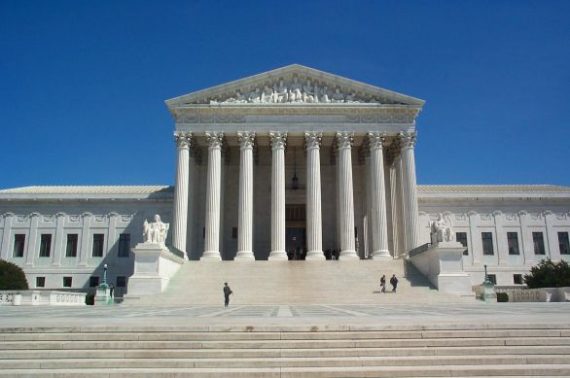Supreme Court: Christian Group Can’t Exclude Gays While Accepting Public Funds
Once again, the Supreme Court affirmed today that there is no Constitutional right to receive public funds.
Another decision handed down by the Supreme Court today reiterated the old adage that he who pays the piper calls the tune:
WASHINGTON (AP) — An ideologically split Supreme Court ruled Monday that a law school can legally deny recognition to a Christian student group that won’t let gays join, with one justice saying that the First Amendment does not require a public university to validate or support the group’s ”discriminatory practices.”
The court turned away an appeal from the Christian Legal Society, which sued to get funding and recognition from the University of California’s Hastings College of the Law. The CLS requires that voting members sign a statement of faith and regards ”unrepentant participation in or advocacy of a sexually immoral lifestyle” as being inconsistent with that faith.
But Hastings, which is in San Francisco, said no recognized campus groups may exclude people due to religious belief or sexual orientation.
The court on a 5-4 judgment upheld the lower court rulings saying the Christian group’s First Amendment rights of association, free speech and free exercise were not violated by the college’s nondiscrimination policy.
”In requiring CLS — in common with all other student organizations — to choose between welcoming all students and forgoing the benefits of official recognition, we hold, Hastings did not transgress constitutional limitations,” said Justice Ruth Bader Ginsburg, who wrote the 5-4 majority opinion for the court’s liberals and moderate Anthony Kennedy. ”CLS, it bears emphasis, seeks not parity with other organizations, but a preferential exemption from Hastings’ policy.”
Justice Samuel Alito wrote a strong dissent for the court’s conservatives, saying the opinion was ”a serious setback for freedom of expression in this country.”
”Our proudest boast of our free speech jurisprudence is that we protect the freedom to express ‘the thought that we hate,”’ Alito said, quoting a previous court decision. ”Today’s decision rests on a very different principle: no freedom for expression that offends prevailing standards of political correctness in our country’s institutions of higher learning.”
The Cato Institute’s Roger Pilon’s picks up on Justice Alito’s theme in his reaction to the decision:
Justice Ruth Bader Ginsburg, writing for the Court’s three other liberals plus Justice Anthony Kennedy, held that the school’s “all comers” policy, which requires that student organizations accept anyone as members and even as officers, is “constitutionally reasonable,” taking into account all of the surrounding circumstances. That is a new standard for constitutionality when it comes to fundamental rights. And if students, whatever their interests or values, cannot form organizations limited to people who share those interests and values, what’s the point of having student organizations at all? In a word, like the mugger who says “Your money or your life,” today’s opinion enables Hastings to say, “If you want benefits otherwise available to all, you’ve got to give up your right to freedom of association.” No public institution should be able to put people to such a choice.
The problem I have with this is that Pilon, who I generally respect when it comes to Constitutional Law, seems to be confusing the ideas of Freedom of Association/Expression with the “right” to receive official recognition or, in this case, access to student activity funds.
The first is clearly guaranteed by the First Amendment and there’s nothing in today’s decision that says that the members of the Hastings Christian Legal Society can’t form a private group and air their views. The second, though, seems to me to come dangerously close to the idea that their is a right to receive public funds for private purposes, which would seem to be a position that libertarians like the people at Cato would soundly, and correctly reject. As long as the regulations are reasonable and not arbitrary, I see no reason why Hastings Law School should not be permitted to set standards defining which groups can and cannot receive public funding for their activities.






The problem now is what’s going to happen when groups are subverted by those who oppose them. If the Christian group must allow gays then the gay rights organization must now accept anti-gay evangelicals who might disrupt meetings. The list goes on to the point where our freedom of association is at risk.
The best answer is to simply stop funding groups completely.
Steve,
All they have to do is agree that they won’t accept the public funds and they won’t be covered by the regulations.
Problem solved.
@Steve: It is more likely, however, that a gay Christian might want to join the CLS than a straight evangelical would want to attend the local GLB club.
reiterated the old adage that he who pays the piper calls the tune:
I’m dumbfounded by how liberal you’re beginning to appear with your writing. Liberals are quite fond of viewing government money as someone else’s money as compared to conservatives who want to be stingy with government money because they view it as their own money.
Where do you think that the Law School got the money to disburse to the student clubs? You went to Law School and I’d imagine that you, like most every other student, were stuck with a mandatory student activity fee.
You know who payed the piper here? Every student paid, including those Christian students.
Tango,
As far as I’m concerned the scope of government should be drastically reduced to the point where we wouldn’t have to worry about whether or not a public university can impose non-discrimination policies on student groups.
Until then, though, the state of the law is eminently clear. As Elena Kagan learned when she was Dean of Harvard Law School and attempted to bar the military from recruiting on campus.
My alma mater had some sort of black student association. It might have even been called the Black Student Association, IIRC. I assume Hastings extends their limitations to race and sex, as well, so presumably whites are allowed to join the BSA there? There have been kerfuffles in the past about this situation.
It is a bit curious, in a way. The Ham Radio club can presumably discriminate against non-users of Ham Radio, but religious clubs can’t discriminate in the same way.
But in any case, yeah I think the headline sums up the ruling nicely.
Yup you’re right Tango everyone paid including the gay students..
Tango-
First off, get your story straight here. Is it the government’s money, or the students’ money? You switched midway through your rant, and this fact is quite important here. The students are presumably going to this university voluntarily, unlike the mandatory taxes you pay to the government. I realize that universities are partly funded by the government, but you have specifically pointed out the student association fee, which I don’t believe is funded by the government.
In any case, it’s quite reasonable that students shouldn’t have to pay to fund, for example, the KKK, who discriminate based on race. Having the policy extend to the other disallowed discriminations makes quite a bit of sense.
“The second, though, seems to me to come dangerously close to the idea that their is a right to receive public funds for private purposes, which would seem to be a position that libertarians like the people at Cato would soundly, and correctly reject.”
This sums up a problem I perceive with the Cato Institute (and heritage and a few others) as of late. There seems to be a feeling of “No Government intervention/assistance! Unless it helps my cause!”
Doesn’t this essentially just re-affirm the Bob Jones University ruling from the Reagan era?
Does anyone know if the funds in question were mandatory student fees or actual public funds. When I went to college we paid a fee each semester to fund student activities. These were not “public” funds even though I attended a public university. If the funds in question are student activity fees does it make a difference?
I’m operating on the assumption that student clubs are funded by a mandatory student fee, ie an involuntary tax on students, one which has no direct relationship to their education. I’m open to correction on this point.
When Doug writes “The second, though, seems to me to come dangerously close to the idea that their is a right to receive public funds for private purposes” I’m assuming that he is either being sloppy with his argument or he is in possession of facts that clearly show that public funds are being used to subsidize college students joining clubs. I’m betting that he’s being sloppy with his thinking and that public funds are not being disbursed to the clubs, and in fact, the clubs are funded by mandatory student fees. I think you’d really have to twist logic to argue that because a public university is taxing its students and disbursing those funds amongst the students that this activity now qualifies as public spending simply because the university itself is a public institution This would be like a amateur baseball team going out for pizza after a game and requiring everyone to kick in $10 and then declaring that individuals can’t express preferences but must submit to the pizza ordering decisions that please all members
The actual root problem here is the mandatory student fees being used to finance clubs. Do away with this tax and do away with the student union building which rents out rooms to approved groups and declines to rent to disfavored groups and then this particular problem is solved. Personally, I always hated those student union taxes being forced on students.
TangoMan,
Once the students pay the fee to a public university, it becomes “public funds” to be dispensed under rules set forth by the university.
If the students were in charge of this money themselves without any involvement by public university employees, we would have a different set of facts, and possibly a different result
The students are presumably going to this university voluntarily, unlike the mandatory taxes you pay to the government.
To tell you the truth I don’t think I’ve ever heard of a university that didn’t impose a mandatory student union fee on all students. The implication of this is that one cannot voluntarily choose to go to another institution if one doesn’t agree with the student union tax at the university of your first choice. Secondly, the mission of the university is to educate the students, not to fund their recreational activities. These student union taxes are just as mandatory as taxes paid to government.
Once the students pay the fee to a public university, it becomes “public funds” to be dispensed under rules set forth by the university.
So a fee that a student pays for a field trip sponsored by their public university is now a publicly funded field trip? A fee that a student pays to fund a dance at a public university is now construed as the university putting on a dance for student by using public funds? When the student union charges students for tickets to a concert by Justin Beiber then the public can get outraged that public funds are being used to fund a concert for students?
When a public university uses its position to collect funds for another organization, the student union, is the student union also a public agency?
Tango,
Is there any discrimination that you think should not be allowed by a student group receiving University funds?
Fee ≠ Tax
So wait Tangoman finds it outrageous that if a group of people pool their money to go out to eat that the group should have to buy food that everyone who paid will consume??? So you’re advocating that certain people’s 10 bucks are worth more then others just because you agree with them…
Is there any discrimination that you think should not be allowed by a student group receiving University funds?
Fee ≠ Tax
I think it is a fiction to pretend that the university is disbursing public funds to finance these student groups. These funds come directly from the students via mandatory student union fees and when a fee is mandatory then it is a tax.
If I wish to go to university and I pledge to the powers that be that I will not participate in any club activities and therefore my being forced to pay for club activities contradicts the purpose of my attending, the university won’t waive those fees. I pay for the classes that I will attend. That fee is all inclusive in that it pays for janitorial services, it pays for utilities, it pays for grounds maintenance, etc. Student activities have no direct bearing on the education mission. Student activities should be funded voluntarily by the students who are interested in joining clubs that appeal to them.
So wait Tangoman finds it outrageous that if a group of people pool their money to go out to eat that the group should have to buy food that everyone who paid will consume??? So you’re advocating that certain people’s 10 bucks are worth more then others just because you agree with them…
It’s outrageous that as a condition of joining a citywide league (meaning that they are the only game in town), for instance, a per game mandatory fee, or tax, is imposed on every player and this fee is then disbursed at a pizza restaurant after each game and the multiple pizzas chosen are decided on by majority vote, so poor Jewish or Muslim players who don’t want to eat pork toppings or vegetarians who don’t want to eat meat toppings. Sure, they can elect to order separately but they still have to make the same contribution to the community pot as every other player who gets to eat the pork or meat topped pizzas.
As I noted above, the root of this problem is the mandatory student activity fee. Do away with that and instruct students to self-finance their own activities with the money that they saved by not paying a mandatory tax, and this problem goes away.
Tangoman — I’m shocked you’re not more upset at the real outrage here. After all, when you pay your college tuition, you’re not just paying for your own classes — you’re being forced to help pay for classes you’ll never take, classrooms you’ll never use, utitilities in building you’ll never enter. And let’s say you’re a humanities major — oh, maybe not. Let’s say a history major. The total cost of those classes? Professor’s salary, rent on the room, wear and tear on the chair. But you’re paying the exact same amount as a chemistry major, whose education is vastly more expensive, what with all those laboratories and chemicals and cool tech thingies. You are being robbed! You must stand up for your rights! You will only pay for that part of the university that you actually use — anything else is communism.
***These funds come directly from the students via mandatory student union fees and when a fee is mandatory then it is a tax.***
A “tax” they don’t have to pay. They don’t like this University?
Go to another. Or better yet, don’t go to any of them.
Tango, this is entirely voluntary. To argue otherwise….
Is….
Stupidity.
Don’t like being taxed on your income. Don’t worry, it’s not mandatory. If you don’t want to pay tax on income, just don’t earn income. See, it’s not mandatory.
The paint is getting closer to your corner, Tangoman.
To quote TangoBrimelow:
“Logic in defense of fairness is no virtue; stupidity in defense of bigotry is no vice.”
(With apologies to Barry G.)
Kind of weird that so many are defending the right of a group to get government money. Shouldn’t they be looking for ways to exclude MORE rent-seekers?
“All they have to do is agree that they won’t accept the public funds and they won’t be covered by the regulations. ”
It is not just the acceptance of funds. Using university property can be considered a use of public funds.
Davod — As I understand it, in this case that is specifically not true. Hastings told the Christian group they could meet on campus if they continued to discriminate, but they couldn’t qualify for funds.
The paint is getting closer to your corner, Tangoman.
Hee hee. What? You think choosing to a specific university is somehow different than earning an income? Why, they’re clearly the *exact* same thing!